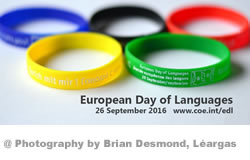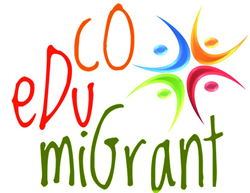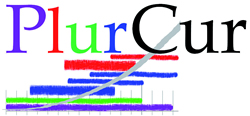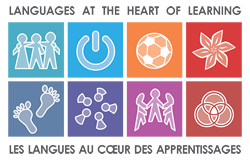Gazette 32 - July-August 2016
Contents
Focus on
Just published
ECML call for fellowship (February – April 2017): "A quality assurance matrix for CEFR use"
Quick links
Focus on
European Day of Languages: Giving voice to Europe’s languages
 #coeEDL
#coeEDL
26 September 2016 will mark the 15th anniversary of the European Day of Languages (EDL). The Day has become an increasingly popular fixture in the calendar of schools all over Europe. The aims of the Day, as declared by the Committee of Ministers of the Council of Europe, are perhaps even more relevant in today’s society than when originally conceived in the aftermath of the 2001 European Year of Languages – namely: to increase plurilingualism and intercultural understanding; to encourage lifelong language learning; and to promote Europe’s rich linguistic and cultural diversity. Thanks in particular to cultural institutes such as the Goethe Institut, the Institut Français and the British Council, EDL is now widely celebrated not just in Europe but also around the world, with events this year scheduled as far afield as Canada, Taipei and Ouzbekistan.
A host of innovative activities celebrating the Day are set to take place this year, with events of all shapes and sizes: from quizzes, language cafés, festivals and exhibitions to speak dating, parades, conferences focusing on approaches to integration, multilingual choirs and theatre and, in recognition of the games in Rio, even a ‘language olympics’. The European Commission’s translation field offices alone are involved in the organisation of 42 different events around the continent, some anticipating up to 5000 visitors.
You can find up to date details of what is going on where and when in the EDL calendar. We hope to be able to come close to, or even exceed, the 900+ events registered in 2015.
The EDL website will shortly be available in 35 languages, (with Basque, Catalan, Latvian and Russian versions of the site all currently being added). There will also be a range of new features on the site in time for the Day.
- downloadable materials that event organisers and schools to reproduce;
- an inventory of freely available online tools and open educational resources for language teaching and learning (developed by the ECML’s ICT-REV project with the support of the European Commission);
- a competition to design an EDL t-shirt - with the winner’s design to be used for next year’s EDL (this year’s t-shirt can be purchased through the site);
- ‘the most innovative EDL event’ competition will be extended to offer a prize for the event receiving the most votes in each participating country (where there are more than 10 events in the EDL calendar).
If you are organising an event in celebration of the EDL this year, no matter how big or small, we would be delighted to receive details to include in the EDL calendar.
Here are just a few of the resources on the EDL website which you can use to help you celebrate the Day:
- EDL calendar of activities: find out what is on the EDL, who is celebrating where, have a look at our map feature displaying the events planned for the Day in Europe and around the world;
- promotional materials to download/order (EDL posters, stickers, wristbands and reflective click bands to order from National Relays and the EDL logo, banners, flyers, postcards to download);
- language facts and fun: discover some of the interesting facts and figures relating to Europe's languages and a range of games and language learning activities suitable for anyone interested in languages;
- language trivia: some of the amusing, strange and unique aspects of Europe’s languages;
- EDL photo gallery: get a first-hand impression of what happened on the Day last year;
- language quiz: test your knowledge on languages;
- assess your language skills: the 'Self-evaluate your language skills' game helps you to assess your level of proficiency in the languages you know according to six reference levels defined within the Common European Framework of Reference for Languages (CEFR);
- find out more about sign languages.
Just published
EducoMigrant - Collaborative community approach to migrant education - A virtual open course for educators
 Authors: Andrea Young, Roula Tsokalidou, Ruth García Carrasco, Vicky Macleroy
Authors: Andrea Young, Roula Tsokalidou, Ruth García Carrasco, Vicky Macleroy
The resources offer innovative ways to enhance young migrants’ education by developing links between schools, the home and local partners in education. This educational joint venture develops the learners’ skills in the language of schooling as well as their plurilingual competences. The website offers a Virtual Open Course hosted on a Moodle platform and strategies and materials for trainers in multilingual educational settings.
Target users: teachers (language teachers, subject specialists, complementary school/heritage language teachers) across pre-school, primary and secondary sectors; teacher educators and teaching assistants; school administrators and psychologists; parents/caregivers; community language organisations.
- Flyer: English - French
- Virtual online course on the Moodle platform: only available in English (in the process of translation into French)
- What do you think about these resources? English - French
Plurcur - Towards whole-school language curricula - Examples of practice in schools
 Authors: Britta Hufeisen, Elisabeth AllgäuerHackl, Joachim Schlabach, Kristin Brogan and Ute Henning
Authors: Britta Hufeisen, Elisabeth AllgäuerHackl, Joachim Schlabach, Kristin Brogan and Ute Henning
The resources provide tools which help to clarify, develop and implement plurilingual, intercultural and inclusive whole-school policies in different contexts in ECML member states:
- A publication: Mehr Sprachen? – PlurCur! Berichte aus Forschung und Praxis zu Gesamtsprachencurricula, Schneider Verlag, 2015, ISBN 978-3-8340-1536-5.
Available in German only: Table of contents - Sample pages.
Online English version foreseen for 2016.
- A website including examples of activities implemented by PlurCur partner schools to establish whole-school language curricula, as well as success factors for the implementation of whole-school language policies.
Target users: teachers, teacher trainers, decision-makers in educational policy, researchers.
ECML call for fellowship (February – April 2017): "A quality assurance matrix for CEFR use"
 Closing date for applications: 28 October 2016.
Closing date for applications: 28 October 2016.
The quality assurance matrix for CEFR use is an innovative project comparing CEFR implementation in different contexts and employing a quality assurance approach. The project will produce a practical tool, in the form of a template, which will serve for self-assessment before or during CEFR implementation and self- or external evaluation after the implementation.
For further details visit this page.
Quick links
Council of Europe
Council of Europe news
Directorate of Democratic Citizenship and Participation
European Day of Languages
European Centre for Modern Languages (ECML)
Language Policy Unit
European Charter for Regional or Minority Languages
Pestalozzi Programme
Stay connected with the ECML
News on the ECML portal
ECML on Facebook
ECML on Twitter
ECML activities 2016
All issues of the European Language Gazette
Not interested anymore? Click here to unsubscribe.
European Centre for Modern Languages of the Council of Europe
Promoting excellence in language education
Centre européen pour les langues vivantes du Conseil de l´Europe
Pour l’excellence dans l’éducation aux langues
A - 8020 Graz, Nikolaiplatz 4
T +43 316 323554-20
F +43 316 323554-4
www.ecml.at
Follow us on  Facebook
Facebook  Twitter
Twitter